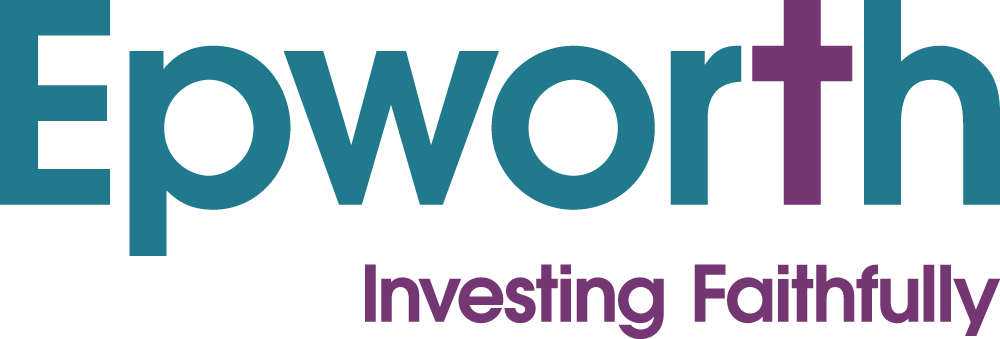Our Christian approach to ethics lies at the heart of our organisation and are consistent with these beliefs. Through improving corporate behaviour within these ethical categories, we believe that companies have the potential to help improve the lives of people and the state of our planet.

All creation belongs to God. We are to be good stewards and are to contribute to the renewal and flourishing of all creation.
We are called to cherish creation and protect the integrity of God’s world. Environmental degradation - particularly climate change, pollution and biodiversity loss - poses grave moral and financial risks. As stewards of our clients’ capital, we are committed to encouraging responsible corporate responses to the risks and opportunities posed by environmental change, with a particular focus on the transition toward lower-carbon business models and practices.
Our engagement focuses on companies’ decarbonisation strategies, nature-related impacts, and alignment with international agreements such as the Paris Agreement. We assess companies’ emissions performance and net-zero commitments, especially those validated by the Science Based Targets initiative (SBTi), and their climate finance disclosures in line with the Task Force on Climate-related Financial Disclosures (TCFD) and other emerging frameworks.
We also engage directly with financial institutions to evaluate their support for high-carbon industries and their alignment with the goals of the Net-Zero Banking Alliance (NZBA). We push for clear transition plans, reduced fossil fuel exposure, and credible exclusion policies on coal, oil sands, and deforestation-linked finance.
Key engagement themes include fossil fuel financing, water use, biodiversity, deforestation exposure, lobbying alignment, nature-related risk management, and transition planning. We challenge poor disclosure, inertia, and greenwashing, and support those showing leadership in sustainable innovation, regenerative business models, and genuine climate accountability.
We also acknowledge the complexity and tension within the transition to a sustainable economy. For many of the world’s poorest communities, access to affordable and reliable energy is essential for development, education, and basic healthcare. We recognise that an overly rapid divestment from all fossil fuels without viable alternatives may risk deepening energy poverty. Our approach seeks a balance: pushing for ambitious climate action while advocating for a just transition that includes energy access, economic inclusion, and investment in clean infrastructure for low-income regions. This is central to our ethical understanding of climate justice.

All people have the right to employment at a living wage and in conditions that do not violate their human dignity or deny their opportunity to flourish.
Every worker is worthy of dignity. Yet labour exploitation remains rife in global supply chains, particularly in high-risk sectors such as agriculture, apparel, logistics, and electronics. Inadequate oversight, weak regulation, and the pursuit of cost efficiencies often leave workers vulnerable to unsafe conditions, poverty wages, and abuse. One of the gravest concerns remains the exploitation of children, often in hidden corners of supply chains and informal economies.
Child labour persists in sectors linked to the global transition to a low-carbon economy, such as artisanal cobalt and tantalum mining - critical inputs for batteries and renewable technologies. While the shift away from fossil fuels is morally urgent, it must not come at the cost of children’s health, freedom, or future. We engage companies to help ensure that sourcing practices are not only environmentally sound but also socially responsible, with full traceability, due diligence, and zero tolerance for child exploitation.
We also assess companies more broadly based on their labour standards, supply chain transparency, human rights due diligence, and living wage commitments. We look for alignment with internationally recognised frameworks such as the UN Guiding Principles on Business and Human Rights (UNGPs), the ILO Core Conventions, and the OECD Due Diligence Guidance for Responsible Business Conduct. We encourage disclosure through initiatives such as the Corporate Human Rights Benchmark (CHRB) and the KnowTheChain assessments.
We expect robust labour codes of conduct, independently verified audits, grievance mechanisms, and credible remediation processes. Our engagement themes include modern slavery prevention, child labour elimination, worker representation, freedom of association, fair contracts, responsible sourcing practices, and the right to organise.
We also engage companies on their approach to workforce well-being, including job security, training, and mental health provision. We advocate for corporate cultures that recognise and empower all workers.
However, we also acknowledge the real-world complexity of labour standards in globalised industries. In some regions, informal work may be the only livelihood option, and abrupt demands to sever supplier relationships can have unintended consequences for the very workers we aim to protect. We recognise the need for nuanced and context-sensitive engagement that pushes for progress while avoiding harm.
Our approach seeks to drive continuous improvement in labour practices through practical, ethical dialogue. We favour companies that demonstrate a proactive commitment to upholding the rights and dignity of workers - not just in policy, but in practice across their value chains.
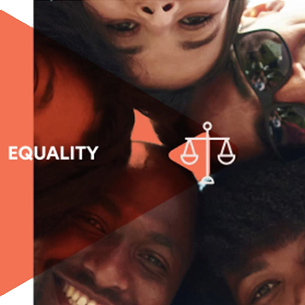
All people are worthy of value and dignity as they are made in the image of God.
Systemic inequality persists across the economy, often reinforced by corporate structures, bias, and culture. Discrimination, whether overt or structural, harms individuals and undermines sustainable value creation. We believe that inclusive business practices are not only morally right, but essential for long-term stability, innovation, and legitimacy.
We assess diversity data, anti-discrimination policies, pay equity, inclusive design, and accessibility standards. We expect alignment with international frameworks such as the UN Women’s Empowerment Principles, the UN Guiding Principles on Business and Human Rights, and the Equity and Inclusion Benchmarking from institutions like the Workforce Disclosure Initiative. We support disclosure through tools like the Bloomberg Gender-Equality Index and Equileap.
Engagement themes include gender and ethnic representation at board and executive levels, pay gap reporting, inclusive recruitment and retention practices, employee voice and belonging, and accessible workplaces. We push for transparency, board accountability, and consistent reporting on diversity, equity and inclusion (DEI) metrics.
However, we also recognise that meaningful progress on equality requires more than data and policies - it requires cultural change and long-term commitment. Some regions or sectors face unique structural barriers to representation, while companies undergoing rapid expansion may struggle to prioritise inclusion. We engage with a contextual understanding of these challenges, seeking practical commitments, leadership accountability, and momentum for change.
We are also attentive to potential trade-offs in the pursuit of other sustainability goals. For example, energy transition sectors, such as mining or engineering, are often male-dominated and lack robust inclusion strategies. We challenge firms in these industries to ensure that the new economy is not built on old inequalities.
We favour companies that not only report on inclusion but show how it drives culture, innovation, and resilience. True equality is not box-ticking, but rather a reflection of the dignity and worth of every person.
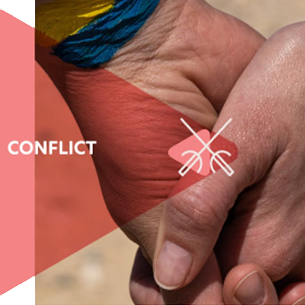
All people and companies should work actively toward peace.
The global arms trade and militarisation undermine peace and human security. As a faith-based investor, we are guided by a theological commitment to nonviolence, reconciliation, and the sanctity of life. We therefore avoid investment in companies involved in weapons production, including those linked to nuclear, chemical or cluster munitions, or those supplying regimes complicit in oppression, war crimes, or systemic human rights abuses.
We assess company involvement in controversial weapons, military contracts, and operations in conflict zones using tools such as the SIPRI Arms Industry Database and the UN Global Compact Principles. We scrutinise financial institutions and technology companies for indirect exposure - such as financing arms production, enabling mass surveillance, or supplying digital infrastructure to oppressive regimes.
Engagement themes include demilitarisation, responsible technology use, export controls, conflict minerals, human rights due diligence, and supply chain accountability. We expect companies to uphold the UN Guiding Principles on Business and Human Rights, conduct enhanced due diligence in high-risk jurisdictions, and publish detailed policies on human rights and conflict risk.
We also recognise tensions between national security, innovation, and ethical investment. Some technologies developed for defence applications, such as satellite imagery, AI, or cyber tools, have dual-use capabilities, meaning they can be used for both civilian and military purposes. These technologies present heightened ethical risks when sold into authoritarian regimes or unstable regions, where they may be used for repression, surveillance, or warfare. We engage companies to ensure clear boundaries and safeguards, transparency on end use, and board-level accountability for ethical governance.
Cybersecurity is a growing area of focus. While it plays a critical role in protecting infrastructure and personal data, it also risks enabling digital warfare, state-sponsored cyberattacks, and human rights violations when weaponised. We engage companies to understand how they assess end-use risk, whether they conduct customer due diligence, and what controls they have to prevent misuse.
We also recognise the ethical complexity of sovereignty and self-defence. The right of nations to protect their citizens is fundamental, but it must be exercised within international law and with proportionate force. We differentiate between legitimate security and arms proliferation, and we seek to hold companies accountable where their activities escalate violence, fuel instability, or erode democratic values.
The transition to a sustainable and secure world must not be built on tools of destruction. We support peacebuilding, conflict-sensitive business models, and investment in post-conflict reconstruction that respects human dignity and supports long-term reconciliation.
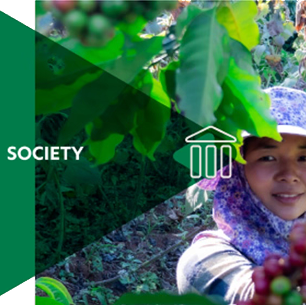
All people should be enabled to thrive in flourishing communities and have the opportunity to enjoy life in its fullness. The poor and those who are excluded should be centred and prioritised.
No business exists in a vacuum. From taxation to lobbying, companies shape and are shaped by the societies in which they operate. Corporate behaviour that undermines public trust or exacerbates inequality presents long-term risks to both communities and investors. We therefore place a strong emphasis on how companies contribute to or detract from the health, resilience, and fairness of the wider social fabric.
We assess responsible tax conduct, political transparency, human rights due diligence, and social licence to operate. We look for alignment with the responsible tax principles, the OECD Guidelines for Multinational Enterprises, and the UN Global Compact. We favour companies that engage constructively with policymakers, contribute to local development, and uphold their social contract with communities.
Engagement themes include fair tax practices, anti-corruption, land rights, community consultation, responsible lobbying, and corporate influence. We are especially focused on ensuring companies do not use their influence to block regulation that benefits people and planet, or to avoid fair contributions to public goods such as healthcare, infrastructure and education.
We favour firms enabling positive health outcomes and oppose those whose core business model depends on harm, such as tobacco or ultra-processed foods. We expect companies to align with frameworks such as the Access to Medicine Index, the Access to Nutrition Index, the WHO International Code of Marketing of Breast-milk Substitutes, and the UN Guiding Principles on Business and Human Rights where applicable to healthcare delivery and supply chains.
We engage with pharmaceutical companies on pricing transparency, equitable access in low-income countries, and R&D that prioritises unmet medical needs over market size. With food producers and retailers, we look at sugar reduction, marketing to children, and public health disclosures. In the tech sector, we challenge firms on platform design that contributes to mental health harms or the spread of disinformation.
We also recognise tensions and trade-offs. In some cases, aggressive tax optimisation may be legally permissible but ethically questionable, especially when undertaken by companies that benefit from public subsidies or infrastructure. Similarly, companies expanding into new markets must navigate different legal, cultural and social expectations, which requires discernment and humility.
We challenge companies to adopt a long-term view of social responsibility - one that moves beyond compliance toward active contribution. We favour those that invest in community resilience, prioritise transparency, and build trusted relationships with stakeholders.
A just society depends on institutions that operate with fairness and integrity. Businesses have an essential role to play in that vision and must be held to account accordingly.
Our approach is to advocate for balanced solutions: protecting incentives for research and innovation while calling for equitable pricing and inclusive distribution. We favour companies that show a deep understanding of health as a public good, and who work with, not against, governments and civil society to tackle root causes of ill-health.
True well-being is not simply the absence of disease, but the presence of justice, opportunity, and human flourishing. We aim to invest in companies that seek to advance this vision holistically.

All people have the right to the essential elements that contribute to human flourishing: healthy food, clothing, secure housing, healthcare, education, and social programmes.
Companies impact public health through the safety and accessibility of their products and services. As lifestyle diseases rise and health inequity persists, we assess companies’ contributions to well-being across sectors - from food and pharmaceuticals to media and tech. Engagement themes include product safety, responsible marketing, access to medicines, misinformation, digital addiction, and the social determinants of health.
We favour firms enabling positive health outcomes and oppose those whose core business model depends on harm, such as tobacco or ultra-processed foods. We expect companies to align with frameworks such as the Access to Medicine Index, the Access to Nutrition Index, the WHO International Code of Marketing of Breast-milk Substitutes, and the UN Guiding Principles on Business and Human Rights where applicable to healthcare delivery and supply chains.
We engage with pharmaceutical companies on pricing transparency, equitable access in low-income countries, and R&D that prioritises unmet medical needs over market size. With food producers and retailers, we look at sugar reduction, marketing to children, and public health disclosures. In the tech sector, we challenge firms on platform design that contributes to mental health harms or the spread of disinformation.
We assess responsible tax conduct, political transparency, human rights due diligence, and social licence to operate. We look for alignment with the responsible tax principles, the OECD Guidelines for Multinational Enterprises, and the UN Global Compact. We favour companies that engage constructively with policymakers, contribute to local development, and uphold their social contract with communities.
Engagement themes include fair tax practices, anti-corruption, land rights, community consultation, responsible lobbying, and corporate influence. We are especially focused on ensuring companies do not use their influence to block regulation that benefits people and planet, or to avoid fair contributions to public goods such as healthcare, infrastructure and education.
We also acknowledge the ethical complexities and tensions that arise. For instance, intellectual property protections are essential for pharmaceutical innovation but can also restrict access to life-saving treatments. Likewise, the rapid digitalisation of healthcare, while improving access, raises concerns around data privacy, exclusion of marginalised groups, and commercialisation of sensitive health information.
Our approach is to advocate for balanced solutions: protecting incentives for research and innovation while calling for equitable pricing and inclusive distribution. We favour companies that show a deep understanding of health as a public good, and who work with, not against, governments and civil society to tackle root causes of ill-health.
True well-being is not simply the absence of disease, but the presence of justice, opportunity, and human flourishing. We aim to invest in companies that seek to advance this vision holistically.
We challenge companies to adopt a long-term view of social responsibility - one that moves beyond compliance toward active contribution. We favour those that invest in community resilience, prioritise transparency, and build trusted relationships with stakeholders.
A just society depends on institutions that operate with fairness and integrity. Businesses have an essential role to play in that vision and must be held to account accordingly.
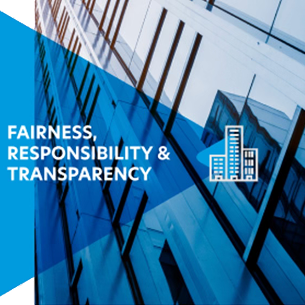
Companies are participants in society and share in the individual's obligation to justice and the common good. Seeking the common good involves honesty and truth, and may demand restitution, forgiveness, reconciliation and ultimately transformation.
Good governance underpins all other pillars. Weak governance structures often correlate with poor environmental and social performance. We assess companies on their governance practices including board independence, competence and diversity; executive remuneration alignment; shareholder rights; risk oversight; anti-corruption controls; and responsiveness to controversies.
We look for alignment with standards such as the G20/OECD Principles of Corporate Governance, the UK Corporate Governance Code, and benchmarks like the Corporate Governance component of the World Benchmarking Alliance. We expect companies to maintain whistleblower protections, disclose lobbying activities, and ensure transparent decision-making structures that uphold long-term accountability.
Engagement themes include ethical leadership, shareholder democracy, transparency of lobbying and political donations, ESG-linked remuneration, and governance response to emerging risks. Where boards fail to respond to material concerns, we escalate through AGM questions, voting sanctions, and collaborative investor action.
We also recognise the evolving nature of governance challenges such as algorithmic decision-making, AI ethics, and the governance of sustainability data. As companies navigate digital transformation and regulatory shifts, we assess whether their governance frameworks are equipped to manage systemic risk and uphold human dignity.
At the same time, we acknowledge governance dilemmas such as balancing managerial discretion with stakeholder accountability, or ensuring independence in jurisdictions with limited board talent pools. We aim for discernment, holding companies to high but context-sensitive standards.
We favour organisations where good governance is not a compliance exercise but a culture embedded through tone from the top, integrated risk management, and an ethical commitment to transparency, fairness, and long-term value creation.
Our Christian approach to ethics lies at the heart of our organisation and are consistent with these beliefs.
